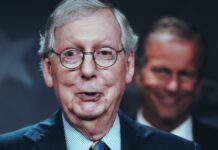
NORML Founder Keith Stroup
For NORML’s 50th anniversary, every Friday we will be posting a blog from NORML’s Founder Keith Stroup as he reflects back on a lifetime as America’s foremost marijuana smoker and legalization advocate. This is the seventh in a series of blogs on the history of NORML and the legalization movement.
The Important Role of Medical Experts in Support of the Legalization Movement: Dr. Lester Grinspoon, Dr. Norman Zinberg, and others.
When I started NORML in late 1970 I realized that our movement would need the support of some courageous doctors and other health experts to overcome the widely-held perception that existed at that time that marijuana must remain a crime to protect the public health.
The exaggerated claims of harm raised by our political opponents today seem amazingly modest when compared with the outrageous claims being made by the anti-pot crowd 50 years ago. Many now warn that legalization will lead to a corporate takeover of the marijuana industry by those in the alcohol and tobacco industries, and in an attempt to sound more reasonable (they read the same polling that we see), they no longer say that they think we should jail marijuana users. Their excuse now for publicly opposing and lobbying against legalization is to protect us all from the perceived dangers from “big marijuana” and their supposed underhanded marketing practices.
But back then, our opponents’ messaging was far more hyperbolic. They included opponents such as Dr. Gabriel Nahas from Columbia University, who was claiming at the time that marijuana contributed to cancers of the head and neck, leukemia, infertility, brain damage and a weakening of the immune system. (Dr. Nahas would later, in the 1980s become a public ally of Nancy Reagan and her “just say no” campaign.) The New England Journal of Medicine once described his work as “psychopharmacological McCarthyism that compels him to use half-truths, innuendo and unverifiable assertions.”
Another of our high-profile opponents was Dr. Forrest Tennant, an alleged expert on pain management and substance abuse, who ran the UCLA methadone program. Tennant claimed that marijuana smoking caused brain damage and lowered testosterone in men by 40 percent, a claim that was sure to get the attention of young male smokers. Tennant was most famous for claiming he had developed methods of examining eyes to detect the presence of drugs in the system. His “rapid-eye exam” was marketed to parents as an aid to help them determine if their teenagers were smoking marijuana. While endorsed by many in law enforcement, the test was eventually shown to be a fraud, inaccurately finding both false positives and false negatives.
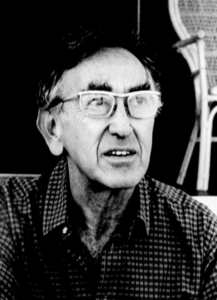
Dr. Norman Zinberg, MD
Zinberg and Weil to the Rescue
Fortunately, I had been pulling together a few medical experts to serve on NORML’s advisory board to provide credibility and expertise to the organization. So when it was announced that the National Commission on Marijuana and Drug Abuse (aka the Shafer Commission) was going to hold its initial public hearings in Washington, DC , this seemed like a good place to use NORML’s experts.
I convinced two early advisory board members, Norman Zinberg, M.D., a clinical professor of psychiatry at Harvard Medical School, and Andy Weil, M.D., a recent Harvard Medical School graduate, to travel to D.C. for the first day of the commission’s hearings, for the purpose of staging a press conference to counter the government’s witnesses. It was important that we challenge the narrative they were trying to advance.
Zinberg was a consultant with the Washington, DC-based Drug Abuse Council during the 1970s. He was frequently the medical expert who would take the time to review the latest well-publicized, exaggerated claims of the alleged dangers of smoking pot and show why the claims were frequently bogus — bad science being used to support a preconceived political position. (Later in his life, he wrote an important book entitled Drug, Set, And Setting: The Basis For Controlled Intoxicant Use (Yale University Press), making the argument that the effects of recreational drugs were not solely based on pharmacology, but were also the result of the circumstances surrounding the drug use.)
Dr. Zinberg helped NORML successfully push back against the claim that marijuana use led to “amotivational syndrome,” a then-popular allegation that marijuana smokers were lazy and spent their time stoned on the couch, as well as other popular claims that cannabis caused brain damage and chromosome damage. Because Dr. Zinberg was familiar with drugs himself, both personally and professionally, he was not easily misled by his more policy-driven colleagues.
He and I became close friends and I used to value the private time when we could just hang out and get high and try our best to solve the nation’s problems. We remained close personally, and he remained a member of the NORML Advisory Board, until his death in 1989.
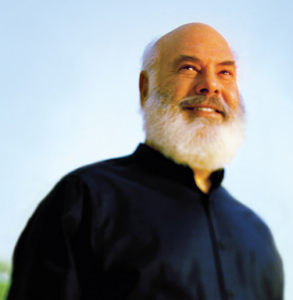
Dr. Andrew Weil, MD
Our other expert at that press conference, Dr. Andy Weil, was the author of a landmark book entitled The Natural Mind: A New Way of Looking at Drugs and the Higher Consciousness, which was the first book I had read that had attempted to make the case that “stoned thinking” was, in fact, more insightful and helpful than “straight thinking.” Dr. Weil, with his Harvard Medical School credentials, could say in print what many of us were thinking privately but lacked the political courage to say at that time.
I have always admired Andy Weil’s innovative, sometimes groundbreaking work and have enjoyed watching his very successful mainstream career as an advocate for a different, more healthful lifestyle. But when I knew Andy, it was a different time, and we were all trying to pick and choose from several choices in life, choices that may not have been available to earlier generations, including the use of recreational drugs to try to achieve a higher consciousness, influencing what personal goals and values to pursue.
With the help of a friendly House member, Democratic Representative James Scheuer of New York, we managed to reserve a room to hold our press conference in the same House office building where the Marijuana Commission was holding its hearing. That morning, before the commission broke for lunch, we placed a big sign in front of their hearing room announcing our press conference just down the hall. And to further whet the interest of the press corps covering the hearing, just before the lunch break I managed to plant a friendly question via Chicago Sun-Times reporter William Hines, who asked Chairman Shafer if he was aware of the charges by Keith Stroup of NORML that the commission hearings were rigged. Chairman Shafer, taken aback by the question, responded that perhaps I should speak for myself — never anticipating that I would do just that — whereupon I stood up and invited everyone to NORML’s press conference when they took their lunch break.

The Natural Mind
It worked. As might be expected, much of the press assembled to cover the new commission were intrigued, and when the body broke for lunch many of the reporters walked the few doors down the hall to attend the NORML press conference. Drs. Zinberg and Weil were great, citing numerous studies to refute the exaggerated claims of the commission’s initial witnesses, with the result that the next day’s news coverage of the commission hearing also included significant coverage of NORML’s allegations that the commission was biased and uninterested in hearing our viewpoint. Even the national television news coverage included footage of Zinberg and Weil from the NORML press conference, balancing the footage of the two anti-marijuana psychiatrists who had testified before the Commission that morning. NORML had managed to crash the Commission’s party, by piggybacking on the coverage of their hearing and planting ourselves right in the middle of the news story.
As a new public interest lobby that few had even heard about, NORML would never have been taken seriously if we had attempted to challenge these anti-pot researchers ourselves. “You are a lawyer, not a doctor,” would have been the response. Only those with medical and scientific credentials would be taken seriously, and it was my first, but certainly not the last, experience utilizing our advisory board for credibility.
Looking back all these years later, it was clearly a major strategic victory for NORML and provided millions of Americans their first introduction to the organization.
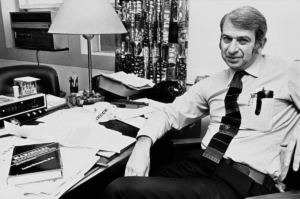
Dr. Lester Grinspoon, MD
Dr. Lester Grinspoon
It was also at this first set of marijuana commission hearings that I had the opportunity to meet Dr. Lester Grinspoon, the individual who would subsequently become the intellectual leader of the marijuana legalization movement and a major player within NORML. Grinspoon was the most prominent pro-pot medical witness to be invited to testify at those Washington, DC hearings.
Before his recent retirement, Professor Lester Grinspoon, M.D. was a psychiatrist and Harvard Medical School professor, as well as author of the 1971 book Marihuana Reconsidered, which had an enormous impact on my early thinking (and is still the most valuable book ever written on marijuana policy).
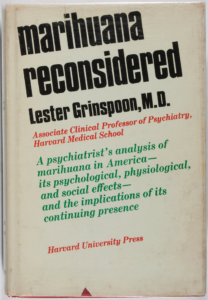
Marihuana Reconsidered
Marihuana Reconsidered chronicles Grinspoon’s evolution from a Harvard professor setting out to write a book on the assumption that marijuana is a terribly dangerous drug with little if any social utility, only to learn, via both his research and ultimately his personal experience, that marijuana was in fact relatively harmless.
One of Grinspoon’s first inklings of that truth came from an intellectually unimpeachable source: the late Carl Sagan, the renowned astronomer. Before Sagan took up his tenured professorship of Astronomy and Space Sciences at Cornell University in 1970, he and Grinspoon were both instructors at Harvard when they met and immediately connected, primarily over their common interest in ending the Vietnam War. As the two became friends, Sagan at one point confided that he enjoyed smoking marijuana when he relaxed, and suggested that Grinspoon would likely find it an interesting experience as well. At the time Grinspoon reacted with concern that the marijuana might be harming Sagan’s health and shared that concern with his good friend. But the fact that his bright, committed Harvard colleague would find some value in cannabis obviously piqued Grinspoon’s interest, and opened his mind to the possibility that what he thought he knew about marijuana just might not be true. In that sense, it may have been Carl Sagan who paved the way for Marihuana Reconsidered. Sagan’s wife, producer Ann Druyan, subsequently joined the NORML board of directors and served with distinction for many years.
And what a bold path it turned out to be. Instead of putting out a tome confirming marijuana’s supposed dangers, Grinspoon published a masterpiece of a thesis calling for an end to marijuana prohibition and the establishment of a legally regulated market with age and quality controls along the lines of the alcohol model.
By then a few other good books had been published reaching the same conclusion, including former US Attorney General Ramsey Clark’s Crime In America, Stanford University Professor John Kaplan’s Marijuana, The New Prohibition, and Edward Brecher’s Licit and Illicit Drugs, but only Lester Grinspoon’s Marihuana Reconsidered boasted the impressive imprimatur of Harvard Medical School and the credibility thus conferred.
Dr. Grinspoon, who has also authored nine other books on drugs and drug policy, as well as more than 180 articles in scientific journals, then turned his attention to the medical uses of marijuana, which he detailed in his 1993 volume Marihuana, The Forbidden Medicine.
Danny Grinspoon’s Experience with Medical Marijuana
Around the time Professor Grinspoon was researching Marihuana Reconsidered, his 10-year-old son Danny was diagnosed with acute lymphocytic leukemia. After three years of chemotherapy, the boy was put on a stronger anti-cancer drug, every dose of which resulted in hours of violent nausea and vomiting that left Danny in sheer dread of his next treatment.
One night at dinner a Harvard colleague mentioned to Grinspoon that one of his patients was undergoing chemotherapy, and claimed that smoking a little marijuana made an enormous difference in his ability to deal with the treatments’ side effects. On the drive home, Lester’s wife Betsy asked him if he thought they should try to get some marijuana for Danny. At first, Lester said no, as he did not want to do anything that might compromise their son’s treatment. He assumed that was the end of the story.
A few days later, as he always did on Danny’s chemotherapy days, Lester walked over from his office at Harvard Medical School to be with his son during the difficult treatments. He knew what to expect: the mood in the room was generally apprehensive, with Lester and Betsy reflecting their son’s anxiety as he awaited another round of sickness and vomiting so extreme he’d be left bedridden for hours.
But this time when Lester entered the room something was different. Danny was smiling and seemed relaxed, and so did Betsy. Sensing that he might not be privy to some secret the two of them were sharing, Lester asked Betsy what was going on, and she told him: Danny had smoked part of a marijuana cigarette in the hospital parking lot right before coming in for the treatment, and it appeared to be doing wonders to relieve his anxiety about taking the chemo.
Betsy confessed to her husband that earlier that day she had taken Danny to the local high school so he could contact a friend of his, who within a few minutes had returned with a small bag of marijuana. Given the overwhelming improvement in the way his son was handling the situation, apparently as a result of smoking the pot, Grinspoon could hardly be angry. Quite the contrary: what he felt was that this was worth learning more about.
When the attending physician came in to administer the chemotherapy, he too commented on Danny’s noticeably improved mood, although he did not know its cause at the time. But there was also another, even more remarkable change in the 13-year-old cancer patient that day. When the treatment was over, instead of vomiting for several hours as usual, Danny asked his mother if they could stop for a submarine sandwich on the way home. Then he asked if he could return to school that day. It was a dramatic change his medical-scholar father could simply not ignore.
Grinspoon quickly contacted his son’s team of physicians and explained the seemingly miraculous improvement in Danny’s ability to withstand his chemotherapy. The lead doctor asked if there was any scientific research supporting this notion Grinspoon was suggesting, to which Lester replied that the mid-nineteenth-century medical literature was replete with reports of marijuana being administered to patients in extract form to treat severe nausea.
At that, the lead physician told Lester he and Betsy should continue to give the marijuana to their son just before each chemotherapy treatment. What’s more, he said they should bring the marijuana into the doctor’s office and smoke it there rather than in the hospital parking lot. And that became the Grinspoons’ regular routine for the balance of Danny’s treatment.
Sadly, the cancer did eventually take the life of young Danny Grinspoon, but the quality of his last several months was dramatically improved because of his use of marijuana.
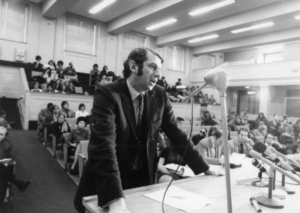
Lester Grinspoon testifies before the Massachusetts House, 1971
Grinspoon brooded for years over the fact that there was no modern research evaluating the medical value of marijuana and encouraged some of his Harvard colleagues to try to get some new studies authorized. He was told that the government would permit research only on pure THC and would never allow a study on the possible uses of smoked marijuana. When he tried to argue that the reports in the medical literature of the mid-1800s were promising enough to deserve further scrutiny, he was informed that because those reports had been written long before the development of double-blind studies, their findings were no more than anecdotal accounts and as such unworthy of serious medical consideration. Grinspoon proceeded to write a book on hallucinogens and another on cocaine, but in the back of his mind, he never stopped resenting the failure of modern science to follow these early leads on marijuana.
Finally, in 1990 Grinspoon began to collect as many modern anecdotal reports of the positive medical uses of marijuana as he could find and set to work with his colleague and co-author Jake Bakalar on their 1993 book Marihuana, The Forbidden Medicine. Revised and updated in 1997 with still more modern anecdotal reports, it remains a valuable and convincing book on the medical uses of marijuana, from the eyes of a wide range of patients.
Lester’s scholarly credentials continue to make it hard to ignore his long advocacy of marijuana. He has appeared as an expert witness before several committees of the U.S. Congress as well as many state legislative committees. In 1990 he received the Alfred R. Lindesmith Award for Achievement in the Field of Scholarship and Writing from the Drug Policy Foundation in Washington, D.C. In 1999 the NORML board of directors established the Lester Grinspoon Award, our highest honor, and Grinspoon was appropriately the first recipient. Dr. Grinspoon was also a long-serving member of NORML’s Board of Directors and continues to serve on our Advisory Board.
In 1994, when the NORML Board of Directors found itself split into factions and unable to function, Lester was asked to step in and form a new board of his own choosing. The level of confidence implied in that request attests both to Dr. Grinspoon’s enormous impact on NORML over these last five decades and to the especially high regard in which he has always been held. Both sides in the dispute trusted Grinspoon to do the right thing for NORML as well as for the marijuana legalization movement as a whole.
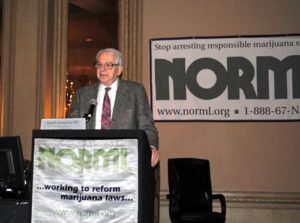
Lester Grinspoon speaks at a NORML Conference
There have been other medical and public health experts who have taken an active role with NORML to advance full legalization of marijuana, including especially Dr. John Morgan, a professor of pharmacology at the City University of New York Medical School, and Lynn Zimmer, PhD., a sociologist at Queens College, New York. Together they authored a book entitled Marijuana Myths, Marijuana Facts in 1997, reviewing the latest scientific and medical research and debunking the common marijuana myths. Both were invited to join the NORML board in 1995 by Dr. Grinspoon when he was reorganizing the NORML board and served on the board of directors with distinction for many years.
But in the end, it is Dr. Lester Grinspoon who has led the way to insist that our marijuana policies be based on legitimate science. He has made it possible for us to have an informed public policy debate leading to the growing list of states legalizing the responsible use of marijuana.






